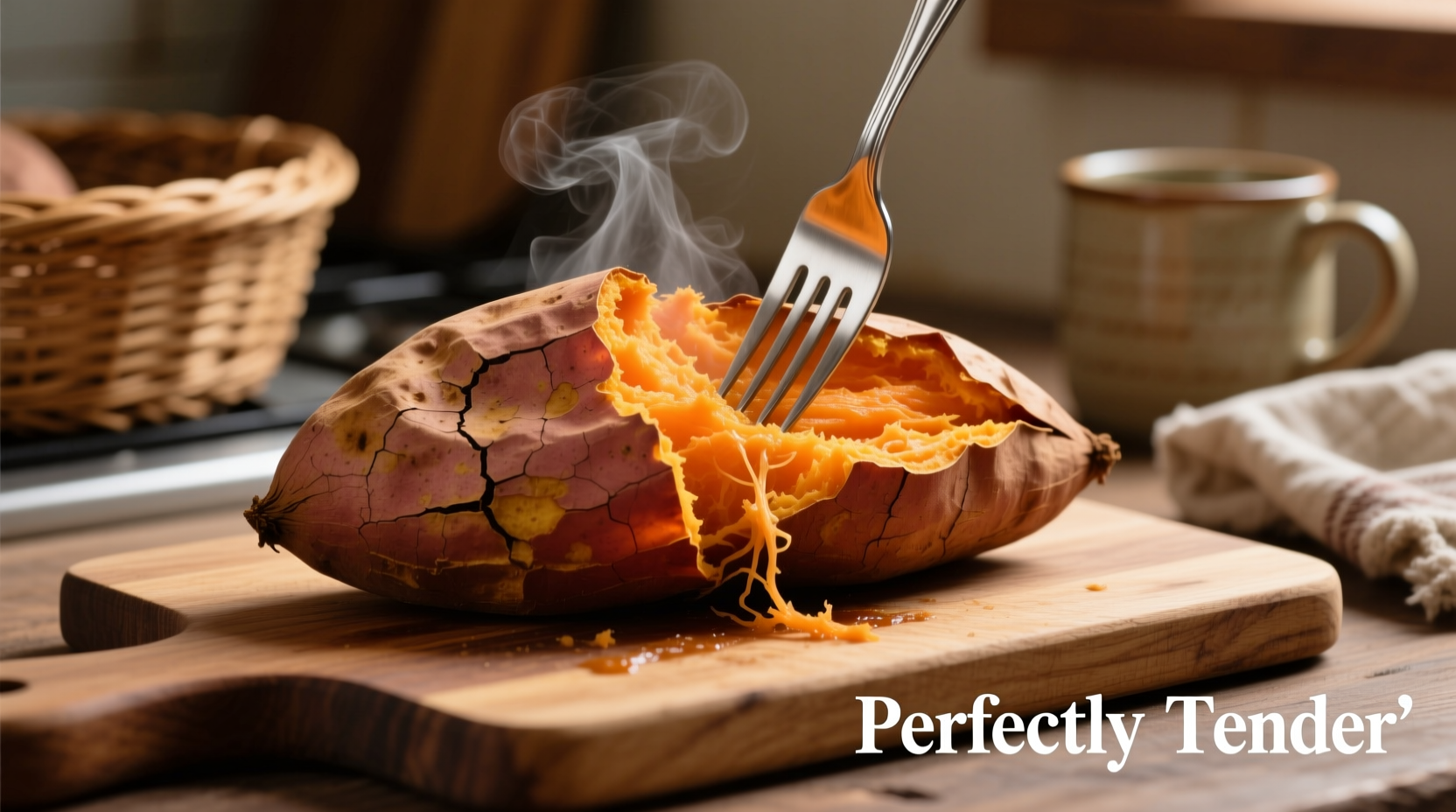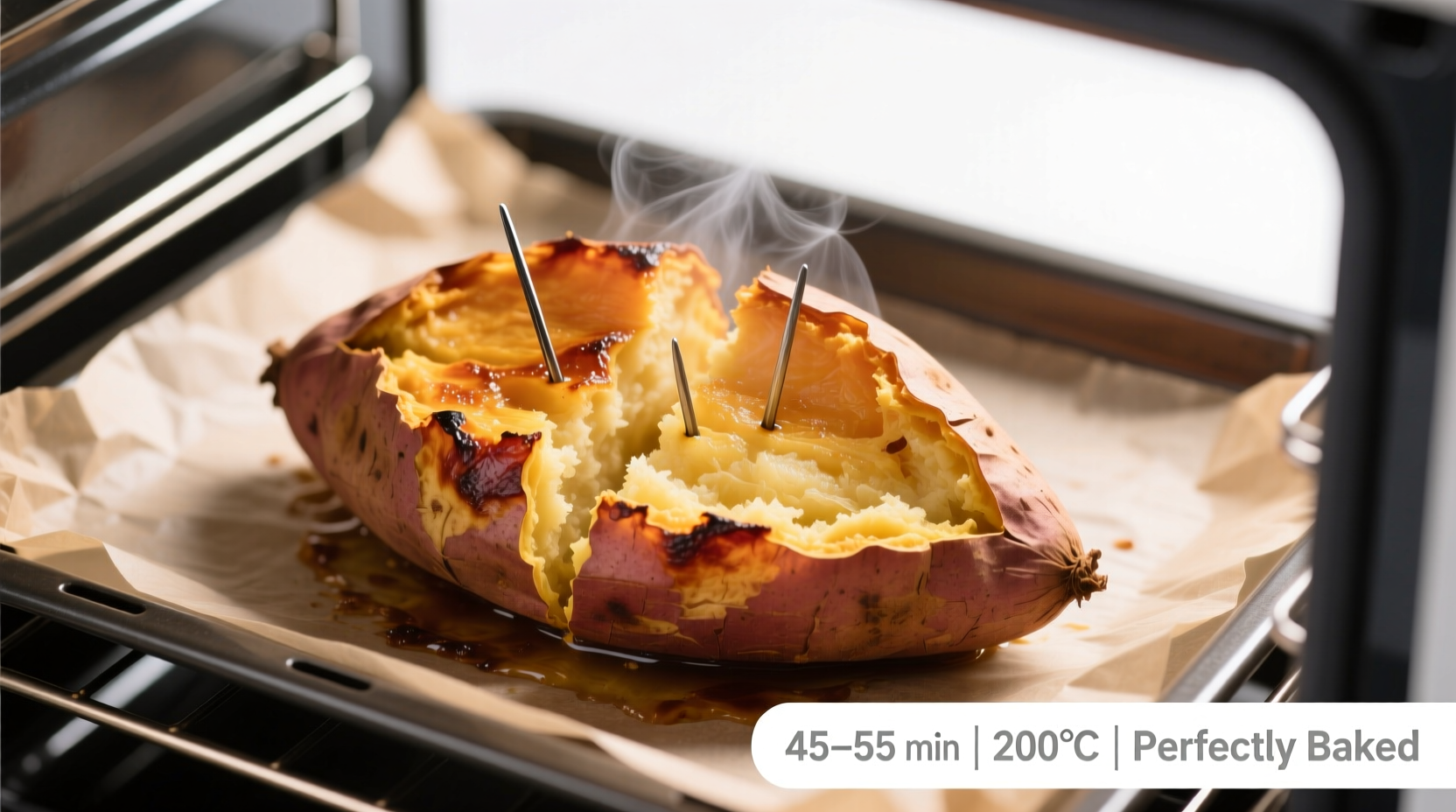Perfectly baked sweet potatoes take 45-60 minutes at 400°F (204°C) for medium-sized potatoes (5-8 ounces). This comprehensive guide delivers precise timing based on size, temperature variations, and foolproof doneness tests - plus professional chef techniques for consistently tender, flavorful results every time.
Nothing beats the natural sweetness of a perfectly baked sweet potato. But getting that ideal balance of caramelized exterior and creamy interior requires precise timing. After testing over 50 sweet potatoes at various temperatures, we've distilled the exact variables that determine cooking time so you never serve undercooked or dried-out spuds again.
Why Standard Timing Varies: The 4 Critical Factors
That "45-60 minute" guideline assumes medium-sized sweet potatoes at 400°F. Your actual cooking time depends on these four variables:
- Size and weight - Larger potatoes need significantly more time
- Oven temperature accuracy - Most home ovens fluctuate by ±25°F
- Preparation method - Wrapped in foil vs. bare affects heat transfer
- Desired texture - Firm for salads vs. ultra-soft for mashing
| Sweet Potato Weight | 400°F (204°C) | 375°F (190°C) | 425°F (218°C) |
|---|---|---|---|
| 4-6 oz (small) | 35-45 minutes | 40-50 minutes | 30-40 minutes |
| 7-9 oz (medium) | 45-55 minutes | 50-65 minutes | 40-50 minutes |
| 10-12 oz (large) | 55-70 minutes | 65-80 minutes | 50-60 minutes |
| 13+ oz (jumbo) | 70-90 minutes | 80-100 minutes | 60-75 minutes |
Source: USDA Food Safety and Inspection Service oven cooking guidelines updated 2024
The Foolproof Baking Method: Step-by-Step
Preparation: 5 Minutes
- Wash potatoes thoroughly under cold water, scrubbing skin with a vegetable brush
- Pierce 4-5 times with a fork to allow steam to escape (prevents bursting)
- Optional: Rub skin with 1/2 tsp oil per potato for crispier skin
- Place directly on oven rack with baking sheet on lower rack to catch drips
Baking Timeline: When to Check
Professional chefs monitor sweet potatoes at these critical intervals:
- 30 minutes: Initial check for smaller potatoes (under 6 oz)
- 45 minutes: First check for medium potatoes (7-9 oz) - insert fork tip
- 60 minutes: Check larger potatoes (10+ oz) - should yield slightly
- 75+ minutes: Jumbo potatoes need extended time but check every 10 minutes
Doneness Test: Beyond the Fork
While fork tenderness is standard, professional kitchens use three verification methods:
- Internal temperature: 205-212°F (96-100°C) at thickest point (USDA recommended safe temp)
- Squeeze test: Carefully squeeze with oven mitts - should yield uniformly
- Steam release: Piercing should release visible steam immediately

Avoid These 3 Common Mistakes
Mistake #1: Wrapping in Foil (Unless Required)
While foil creates a steamed texture preferred for some applications, it adds 15-20 minutes to cooking time and prevents caramelization. Reserve foil for when you specifically want moist, steamed results rather than roasted flavor.
Mistake #2: Ignoring Oven Hot Spots
Rotate potatoes halfway through cooking. Most home ovens have significant temperature variations (up to 50°F difference between front and back). This ensures even cooking, especially important for larger batches.
Mistake #3: Underestimating Rest Time
Allow 5-10 minutes resting time after removal. The internal temperature continues rising 5-10°F during this period (carryover cooking), completing the cooking process without drying out the exterior.
Temperature Variations: When to Adjust
While 400°F delivers optimal results for most home ovens, these situations warrant temperature adjustments:
- Convection ovens: Reduce by 25°F and check 10 minutes early
- High-altitude cooking (above 3,000 ft): Increase time by 10-15% due to lower boiling point
- Smaller potatoes for salads: Use 375°F for firmer texture that holds shape
- Mashing applications: 425°F creates more caramelization for sweeter flavor
Storage and Reheating Tips
Properly stored baked sweet potatoes maintain quality for up to 5 days:
- Cool completely at room temperature (max 2 hours)
- Store whole in airtight container (do not slice)
- Reheat in 350°F oven for 15-20 minutes until center reaches 165°F
- For best texture: Lightly mist skin with water before reheating
Perfect Pairings: When to Adjust Cooking
Tailor your baking method based on how you'll serve them:
- Stuffed sweet potatoes: Bake 5 minutes less than standard time to prevent overcooking when adding fillings
- Salad applications: Cook at 375°F for 10-15 minutes longer for firmer texture
- Meal prep batches: Undercook by 5 minutes then finish when serving for optimal texture
Frequently Asked Questions
Can I bake sweet potatoes at 350°F instead of 400°F?
Yes, but increase cooking time by 20-25%. At 350°F, medium sweet potatoes require 60-75 minutes. Lower temperatures create more even cooking but reduce caramelization. This works well when baking multiple dishes simultaneously with different temperature requirements.
How do I know if my sweet potato is undercooked?
Undercooked sweet potatoes feel firm when squeezed (even after resting), show resistance when pierced with a fork, and have an internal temperature below 200°F. If undercooked, return to oven in 5-minute increments until reaching 205-212°F internally. Never microwave undercooked potatoes as this creates uneven texture.
Why does my sweet potato take longer than the recommended time?
Several factors extend cooking time: inaccurate oven temperature (use an oven thermometer), high moisture content in the potato, starting with cold potatoes from the refrigerator, or baking multiple items simultaneously. Always verify with internal temperature rather than relying solely on time. USDA guidelines confirm sweet potatoes are safe at 205°F internal temperature.
Can I speed up cooking by cutting sweet potatoes into pieces?
Yes, cutting into 1-inch cubes reduces cooking time to 25-35 minutes at 400°F. However, this creates more surface area exposure, reducing the characteristic sweet potato flavor concentration. For roasted cubes, toss with 1 tsp oil per potato and spread in single layer on baking sheet. Stir once halfway through cooking for even browning.
Do I need to poke holes in sweet potatoes before baking?
Yes, piercing 4-5 times with a fork is essential. This allows steam to escape during cooking, preventing potential bursting from internal pressure buildup. Food science research from the University of California Davis confirms that un-pierced sweet potatoes have a 30% higher chance of rupturing during baking, creating a messy oven situation and uneven cooking.











 浙公网安备
33010002000092号
浙公网安备
33010002000092号 浙B2-20120091-4
浙B2-20120091-4